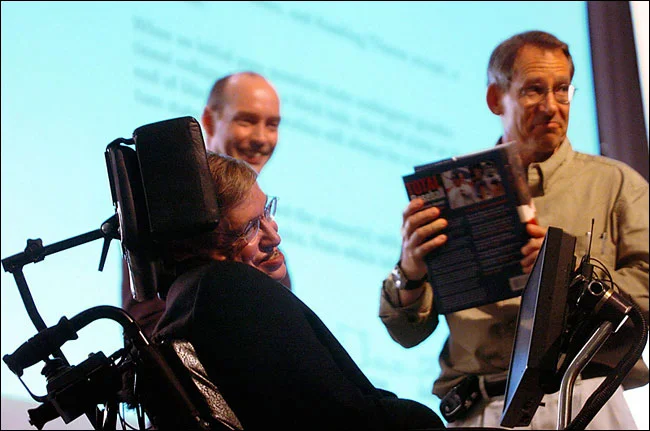Wayne Parrish: R. I. P. Dr. Stephen Hawking
Dr. Stephen Hawking presents the Toronto published Total Baseball to Dr. John Preskill in Dublin in 2004.
By Wayne Parrish
Special to the Canadian Baseball Network
The accent on the other end of the phone was pert, profoundly English and decidedly female so the natural inclination to hang up – honed from manning the late-night phones at a newspaper sports department in the long, dark years before Google sprang to life specifically to more efficiently settle the beer-laden, brawl-inspiring arguments between buddies at the local tavern – did not immediately occur.
“Sir,” she murmured, “Dr. Stephen Hawking is wondering if he might be able to obtain a copy of one of your books?”
Even for a small, fledgling publisher of what my colleagues Jim O’Leary, Greg Oliver, Peter Grucza and I liked to believe were singularly high-quality sports tomes, this was a little hard to fathom.
Then came the explanation, which in those days before Big Bang Theory ushered the theory of relativity full-blown into the pop culture era, took more than a bit of deciphering.
Dr. Hawking, it seemed, was finally prepared to concede a long-active, earnestly-nurtured bet with a fellow astrophysicist named Dr. John Preskill, from the California Institute of Technology, on the nature of black holes.
Dr. Hawking and another Caltech physicist, Dr. Kip Thorne, had made the bet with Dr. Preskill in the 1990s, re-asserting a point Hawking had first made in the early 1970s – namely that information that had been swallowed by a black hole was lost forever. Dr. Preskill argued the opposite – and rather than pistols at 50 paces, the protagonists settled on a gentlemen’s continuum of research with the eventual winner receiving a bound encyclopedia, the idea being that such was the ultimate example of an item from which information could be easily retrieved.
In the early summer of 2004, Dr. Hawking had sent a note to the organizers of the 17th International Conference of General Relativity and Gravitation, set for a few weeks later in Dublin. He declared that he had finally solved the major issue of information escaping from black holes, and was prepared to share his findings at the conference. Given Dr. Hawking’s standing as perhaps the most globally-famous scientist since Albert Einstein, the organizers leapt at the opportunity.
Dr. Hawking initially reached out to Dr. Preskill to enquire whether a cricket encyclopedia would be a worthy settlement of the bet, but Dr. Preskill, a died-in-the-flannels baseball fan, said “rubbish”, or thereabouts, and asked for the latest edition of Total Baseball: The Ultimate Baseball Encyclopedia.
And so it was, on a sunny July afternoon, the call came through to the offices of SportClassic Books, at 21 Carlaw Avenue, Toronto.
A few days later, the author of A Brief History of Time, who had been confined to a wheelchair since shortly after his diagnosis with ALS in the late 1960s, was wheeled onto the stage in Dublin and shared his findings. As the New York Times described it:
“In his new calculation, Dr. Hawking said that because of quantum uncertainty, one could never be sure from a distance that a black hole had really formed. There is no way to discriminate between a real black hole and an apparent one. In the latter case an event horizon, the putative point of last return, could appear to form and then unravel; in that case the so-called Hawking radiation that came back out would not be completely random but would have subtle correlations and thus could carry information about what was inside.”
And the Brits think it’s baseball that defies understanding or explanation?
Having thus conceded the bet, Dr. Hawking asked his assistant to proffer the pristine copy of Total Baseball – couriered ever-so-carefully from east-end Toronto – to Dr. Preskill, who thanked him profusely, noting that he had always hoped there would be witnesses to capture for posterity the moment in which Dr. Hawking conceded.
“This,” Dr. Preskill drily noted of the conference hall stuffed to the brim with 700 of the world’s greatest physicists and a phalanx of reporters and TV cameras, “really exceeds my expectations.”
The passing of Dr. Hawking at age 76 this week prompted Dr. Preskill to pen a tribute for Time (wonderful irony there, eh?) magazine, featuring their famous bet:
“Stephen was fun to be with. I sensed when we first met that he would enjoy being treated irreverently. So in the middle of a scientific discussion I could interject, And what makes you so sure of that, Mr. Know-It-All? After a beat Stephen would respond with a glint in his eye: “Wanna bet?`”
When Dr. Hawking presented him with Total Baseball that afternoon in Dublin, added Dr. Preskill, “Not knowing what else to do, I held the book over my head as though I had just won the Wimbledon final, while a million flashbulbs were popping (it seemed like a million, anyway). One of those pictures wound up in Time.
“We made bets for fun, but the scientific issues in question, founded on some of Stephen’s most far-reaching contributions, are ones many physicists passionately care about. Combining extraordinary depth of thought with an irrepressible sense of play, that’s what I’ll remember best about Stephen Hawking.”
(Editor's Note: Wayne Parrish, former sports editor of the Toronto Sun, is now a Co-Chair, Board of Directors of Basketball Canada. As well, he and daughter Cayleigh Parrish run The SPORT Gallery with locations in the Distillery section of Toronto, Vancouver and Tribeca in New York. He is also CEO of the 2021 Canada Games, which will be hosted by the Niagara District. Parrish is president of Sport Media Enterprises Inc. and fomerly was the CEO of the PostMedia Network. And oh yes, he is one of the best bosses that this ediitor ever had.)


